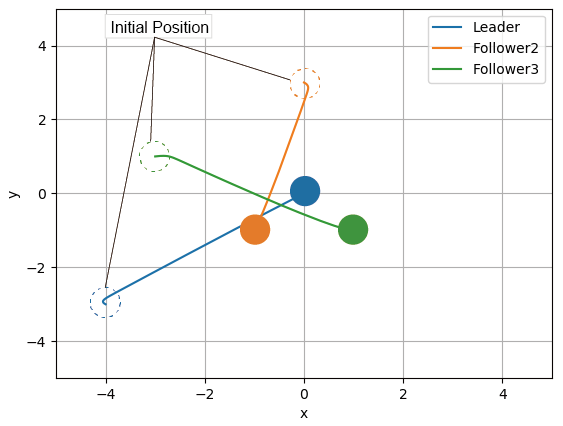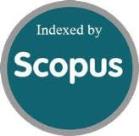Synthesis of Formation Control Systems for Multi-Agent Systems under Control Gain Perturbations
DOI:
https://doi.org/10.46604/aiti.2020.4136Keywords:
multi-agent systems (MASs), consensus, control gain perturbations, guaranteed cost control, LMIsAbstract
This paper proposed a linear matrix inequality (LMI)-based design method of non-fragile guaranteed cost controllers for multi-agent systems (MASs) with leader-follower structures. In the guaranteed cost control approach, the resultant controller guarantees an upper bound on the given cost function together with asymptotical stability for the closed-loop system. The proposed non-fragile guaranteed cost control system can achieve consensus for MASs despite control gain perturbations. The goal is to develop an LMI-based sufficient condition for the existence of the proposed non-fragile guaranteed cost controller. Moreover, a design problem of an optimal non-fragile guaranteed cost controller showe that minimizing an upper bound on the given quadratic cost function can be reduced to constrain a convex optimization problem. Finally, numerical examples were given to illustrate the effectiveness of the proposed non-fragile controller for MASs.
References
K. Zhou, J. C. Doyle, and K. Glover, Robust and optimal control, Prentice Hall, 1996.
K. Zhou, Essentials of robust control, Prentice Hall, 1998.
B. R. Barmish, “Stabilization of uncertain systems via linear control,” IEEE Transaction on Automat Control, vol. 28, no. 8, pp. 848-850, 1983.
I. R. Petersen and C. V. Hollot, “A Riccati equation approach to the stabilization of uncertain linear systems,” Automatica, vol. 22, no. 4, pp. 397-411, 1986.
P. P. Khargonekar, I. R. Petersen, and K. Zhou, “Robust stabilization of uncertain linear systems: quadratic stabilizability and control theory,” IEEE Transaction on Automatic Contrtol, vol. 35, no. 3, pp. 356-361, 1990.
S. S. L. Chang and T. K. C. Peng, “Adaptive guaranteed cost control of systems with uncertain parameters,” IEEE Transaction on Automatic Control, vol. 17, no. 4, pp. 474-483, 1972.
I. R. Petersen and D. C. McFarlane, “Optimal guaranteed cost control and filtering for uncertain linear systems,” IEEE Transaction on Automatic Control, vol. 39, no. 9, pp. 1971-1977, 1994.
L. Yu and J. Chu, “Optimal guaranteed cost control of linear systems: LMI approach,” Proc. 14th IFAC World Congress, Beijing, China 1999, pp. 541-546.
L. Yu and J. Chu, “An LMI approach to guaranteed cost control of linear uncertain time delay systems,” Automatica, vol. 35, no. 6, pp. 1155-1159, 1999.
L. H. Keel and S. P. Bhattacharyya, “Robust, fragile, or optimal?,” IEEE Transaction on Automatic Control, vol. 42, no. 8, pp. 1098-1105, 1997.
P. Dorato, “Non-fragile controller design: an overview,” Proc. American Control Conference, Philadelphia, Pennsylvania, USA, pp. 2829-2831, 1998.
D. Famularo, P. Dorato, C. T. Abdallah, W. M. Haddad, and A. Jadbabaie, “Robust non-fragile LQ controllers : the static state feedback case,” Interational Journal of Control, vol. 73, no. 2, pp. 159-165, 2000.
H. Mukaidani, Y. Takato, Y. Tanaka, and K. Mizukami, “The guaranteed cost control for uncertain large-scale interconnected systems,” Proc. the 15th IFAC World Congress, pp. 265-270, 2002.
H. Oya, K. Hagino, and H. Mukaidani, “Robust non-fragile controllers for uncertain linear continuous-time systems,” Proc. the 31st Annual Conference of IEEE Industrial Society (IECON2005), Raleigh, NC, USA, pp. 1-6, 2005.
D. D. Siljak, Decentralized control of complex systems, Courier Corporation, 1991.
Z. Gong, “Decentralized robust control of uncertain interconnected systems with prescribed degree of exponential convergence,” IEEE Transaction on Automatic Control, vol. 40, no. 4, pp. 704-707, 1995.
S. Nagai, H. Oya, T. Kubo, and T. Matsuki, “Synthesis of decentralized variable gain robust controllers for a class of large-scale interconnected systems with mismatched uncertainties,” International Journal of System Science, vol. 48, no. 8, pp. 1616-1623, 2017.
H. Mukaidani, Y. Tanaka, and K. Mizukami, “Guaranteed cost control for large-scale systems under control gain perturbations,” Electrical Engineering in Japan, vol. 146, no. 4, pp. 43-57, 2004.
R. Olfati-Saber and R. M. Murray, “Consensus problems in networks of agents with switching topology and time-delays,” IEEE Transaction on Automatic Control, vol. 49, no. 9, pp. 1520-1533, 2004.
G. Xie and L. Wang, “Consensus control for a class of networks of dynamic agents: fixed topology,” Proc. the 44th IEEE Conference on Decision and Control, and the European Control Conference 2005, Seville, SPAIN, 2005, pp. 96-101.
Y. Zhang and Y. P. Tian, “Consentability and protocol design of multiagent systems with stochastic switching topology,” Automatica, vol. 45, no. 5, pp. 1195-1201, 2009.
G. Zhai, S. Okuno, J. Imae, and T. Kobayashi, “A matrix inequality based design method for consensus problems in multi-agent aystems,” Internationl Journal of Application Mathematics and Computer Science, vol. 19, no. 4, pp. 639-646, 2009.
S. Ito, K. Miyakoshi, H. Oya, Y. Hoshi, and S. Nagai, “Consensus via adaptive gain controllers considering relative distances for multi-agent systems,” Advcances in Technology Innovation, vol. 4, no. 4, pp. 234-246, August 2019.
S. Boyd, L. El Ghaoui, E. Feron, and V. Balakrishnan, Linear matrix inequalities in system and control theory, SIAM Studies in Applied Mathmatics, 1994.
H. Oya, K. Hagino and H. Mukaidani, “Guaranteed. cost control for uncertain. linear continuous-time. systems. under conrtol gain perturbations,” (in Japanese) Trans. of JSME(C), vol. 72, no. 713, pp. 92-101, 2006.

Published
How to Cite
Issue
Section
License
Submission of a manuscript implies: that the work described has not been published before that it is not under consideration for publication elsewhere; that if and when the manuscript is accepted for publication. Authors can retain copyright in their articles with no restrictions. is accepted for publication. Authors can retain copyright of their article with no restrictions.
Since Jan. 01, 2019, AITI will publish new articles with Creative Commons Attribution Non-Commercial License, under The Creative Commons Attribution Non-Commercial 4.0 International (CC BY-NC 4.0) License.
The Creative Commons Attribution Non-Commercial (CC-BY-NC) License permits use, distribution and reproduction in any medium, provided the original work is properly cited and is not used for commercial purposes.







